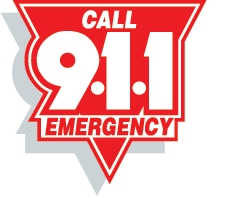 When
to Call 911 When
to Call 911
As a general
set of guidelines, dial the numbers 9-1-1 if you:
- Have an emergency and need police, fire, or
medic response.
- Need an officer to take a report (e.g., stolen
vehicle, burglary, vehicle prowl).
- See suspicious activity (people in the parking
lot looking in cars; strangers loitering where you
need to go and you feel frightened; you come home to
an open door and you're afraid to go inside). If you
have a "gut feeling" you should be talking to the
police, call.
- Would like a "welfare check" on someone who
typically communicates with you and does not respond
after several contacts.
- Have a concern regarding animals. Animal Control
responds to complaints regarding excessive barking,
lost/found, injured or abused animals.
When you
don't know or are in doubt, do not try to
determine if you have an emergency; call 9-1-1
and let the dispatcher assist you.
When the 911
dispatcher answers, he/she will ask what you are
reporting. If it's a non-emergency, say so, then answer
the questions. Let the dispatcher lead the conversation,
as they are looking for very specific information and
need to keep lines clear and use the telephone time
efficiently. They are most likely dispatching emergency
personnel as you speak if the situation warrants.
Enhanced
911 provides
emergency operators with a computer display of the name,
address, and the telephone number of the registered
owner of the telephone being used for the call.
- When you call the telephone company to have
service installed, be sure to give your correct name
and address. Your address may be verified by calling
your local building or planning department. Also,
notify your telephone company if this information
changes.
- The 911
operator will verify your location even though it
may be displayed on the computer screen. Except in
cases when a caller is unable to speak, the computer
information is always verified.
- Telephone number misdials can activate the
numbers 911. If
the caller hangs up, the
911 operator is required to call back and
ensure no emergency assistance is needed. If there
is no response, law enforcement will be dispatched.
- Do you have a cordless telephone? Low batteries
may activate 911.
Check batteries regularly.
- Are your address and telephone number posted
near all telephones? In an emergency, they are
easily forgotten, reversed, or unknown.
- In an emergency, would your house number or
mailbox be easy to read from the street, day or
night? Your house number or mailbox are critical
landmarks guiding police, fire or aid to your door.
- Note that some phone connections, such as party
lines, cellular, and some commercial telephone
applications may not display subscriber information.
In a medical
emergency, seconds count. Emergency personnel will be
sent as quickly as possible.
911 personnel can offer specific instructions
like CPR, Heimlich Maneuver, and childbirth to help
until medical personnel arrive. To determine an
appropriate emergency medical response, you may be
asked:
- The nature of the medical problem
- The approximate age of the individual(s)
involved
- Whether the victim is conscious and/or alert
- Is there any difficulty in breathing?
- Stay calm. Don't get excited. Take a deep
breath.
- Speak clearly
- State the problem you are reporting
- Listen carefully to the questions asked and
instructions given
- Be prepared to answer the following:
- Location of the problem
- Your name
Phone number you are calling from
|

